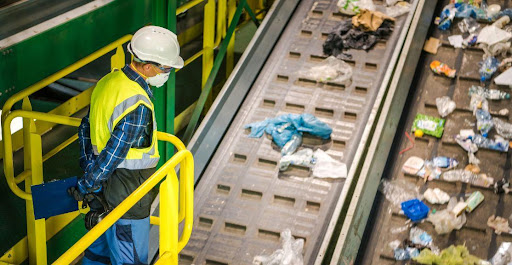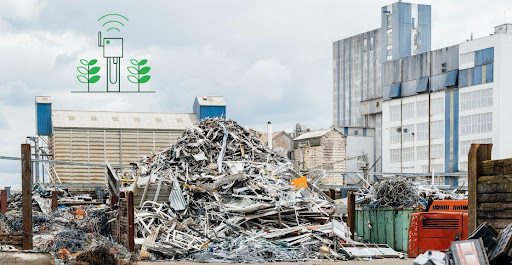By Phillip Dodd, Technology Lead IIoT Engineering Infrastructure & Security, Fiberroad Technology

Waste management is a major concern for many cities. Smart cities can implement smart waste management solutions, including business waste collection, to improve the environment and provide more efficient waste management for both citizens and businesses. These solutions are based on a wireless transmission system and sensor technology. With this, cities can provide citizens with more convenient waste management and increase the lifespan of devices.
Understand the Production Of Waste In Your City
With Industrial Network and IIoT, companies are now able to better understand the production and management of waste in their cities. This technology can help improve overall efficiency in waste collection, waste recycling, and waste disposal. It can also help reduce fuel and manpower costs. These benefits make smart waste management solutions an excellent choice for any city.
By utilizing smart waste management systems, cities can improve recycling rates and reduce emissions from waste. They can also provide real-time data that will inform future innovation and process improvement. Currently, over 75% of the waste stream in the United States is recyclable. The rest ends up in landfills or waterways, polluting the environment and putting living creatures at risk. The fight against waste is far from over, especially as our population continues to rise.
Improvement Of The Environment In Your City
Smart waste management solutions use a variety of technologies to help cities save money and energy. These innovations can also help communities meet sustainability goals and provide better services. Some examples include the use of sensors to monitor garbage trucks and garbage cans, as well as recycling apps. In addition, these solutions can help cities achieve their recycling goals by keeping trash out of landfills.
The implementation of smart waste management solutions is increasing in many cities, including San Francisco. For example, San Francisco is using Bigbelly trash cans, which use solar-powered compactor technology to keep track of waste levels. Meanwhile, Songdo, South Korea, is ditching garbage trucks entirely and using a pneumatic waste disposal system instead.
Provide Citizens With More Efficient Waste Management
Smart cities can use technology to improve waste collection and management. One example is the use of softwares which can optimize waste collection routes and vehicle loads. The softwares can reduce collection costs by 30% or more. They also enable citizens to separate recyclable items, eliminating overflowing bins and unnecessary traffic jams. This can lead to a cleaner city and a more sustainable future.
Waste bins and dumpsters can be equipped with sensors that can detect the level of waste in the compartments. These sensors send data to a gateway via low-power or cellular connectivity. From there, the data can be analyzed and translated into statistical data. The system also provides citizen service by identifying which compartments are nearest to residents and letting them know about their usage levels.

Optimize Waste Bin Capacity Location And Type
Using the smart waste analytics platform, municipalities can optimize waste bin capacity location and type. This solution uses ultrasonic sensor technology to measure bin fill levels in real-time. It can also tell which areas need bigger or smaller bins. In addition, it can synchronize filling patterns between different regions. This way, municipalities can optimize their waste bin locations and types to meet the needs of their citizens.
The study found that waste bins can be optimized according to the location and type of waste generated in different areas. It also found that the most efficient situation is when the bins are filled at the same time and are located on static schedules. This method also improves operational costs.
Remote Diagnostics
Waste management solutions can be improved with smart tools, including waste level sensors, recycling robots, and other technology. These tools use data to make smart decisions about waste collection routes and storage. They also provide real-time information about the fill level of waste containers. By analyzing this data, smart waste management solutions can help improve waste management services and reduce greenhouse gas emissions.
The technology makes garbage trucks spend less time on the road and reduces congestion. In a smart city, garbage trucks can be equipped with sensors that monitor temperature, odor, and location. A high-performance network and management platform are required to provide real-time data and analytics. This gives city waste management officials visibility into the bins and can predict routes. The implementation of remote diagnostics software is key to achieving smart waste management.
Final Thought
IoT sensors in smart waste management solutions can also help cities reduce the environmental impact of garbage trucks. These vehicles release harmful chemicals into the air, which makes them environmentally unfriendly. The use of IoT sensors in waste management solutions can solve this problem and even eliminate the need for garbage trucks. Many cities have implemented trash chutes where IoT sensors detect the waste levels and send trash through pneumatic tubes underground to a central automated compacting facility.
IoT sensors in smart waste management solutions can also improve recycling. They can process the type of material being disposed of in each bin, reducing human error and simplifying downstream recycling jobs. With this technology, smart bins can identify the type of material being discarded, compress it, and alert sanitation workers about its full status.
You may be interested in: How to Make Your Business More Energy Efficient

